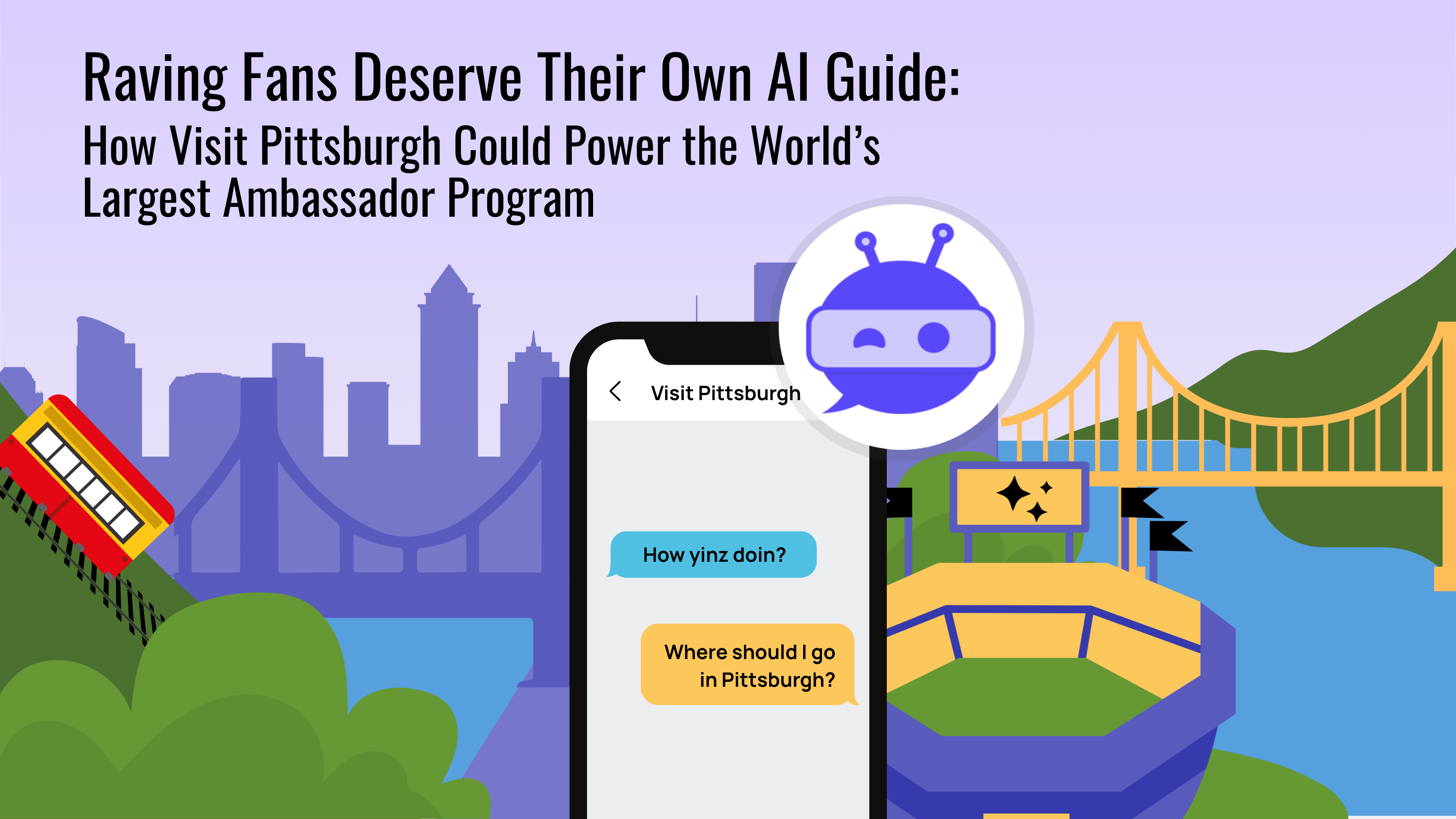
There’s a special kind of pride that follows anyone who’s lived in Pittsburgh. You can hear it in the way they describe the skyline at sunset, the way they talk about bridges like they’re family members, or how they slip “yinz” into conversation like it’s a term of endearment. It’s not just civic pride, it feels like a movement.
Now imagine if every one of those raving fans from the Carnegie Mellon grad now in Austin to the University of Pittsburgh alum teaching in Tokyo could carry a little piece of Pittsburgh with them. Not a mug or a magnet, but a living, talking digital representative of the city. An AI guide that speaks in the same welcoming tone Pittsburgh is known for, ready to share stories, itineraries, and opportunities with anyone curious enough to ask: “So what’s so great about Pittsburgh?”
For quick background: A CVB or Convention and Visitors Bureau is the organization responsible for promoting a destination, attracting tourists, conventions, and business travel, and amplifying the local brand. In Pittsburgh, that’s Visit Pittsburgh one of the defacto storytellers of the city.
Here’s the simple idea: every passionate Pittsburgher should have their own personal AI guide they can share with the world… a customized digital link that becomes their portable Pittsburgh concierge. Whether you’re talking to a friend considering moving to the city, a student looking at colleges, or a colleague planning a weekend visit, you can send them your personal Pittsburgh guide, your own digital co-ambassador.
This isn’t just tourism tech. It’s relationship-driven storytelling at scale. When someone asks, “What should I do in Pittsburgh?” instead of dropping a link to a listicle, you send them a living conversation partner, one that responds with local events, hidden gems, and that inside humor only a Pittsburgher would understand.
Each of these AI guides would be powered by Visit Pittsburgh’s verified data: attractions, restaurants, events, seasonal updates but layered with personality and local flavor that ambassadors help define. The guide would literally “speak Pittsburgh,” and every interaction would help the city understand what prospective visitors care about most.
Meet Sarah. She came to Carnegie Mellon for engineering, fell in love with the city’s food scene but left Pittsburgh to work for a startup in California - don’t judge her, people have to make calls all the time that are more than just what they want to do. She still cheers for the Steelers, argues about the best pierogi spot, and lights up when someone asks about the hidden gems of the mid Atlantic.
Now imagine Sarah with her own Pittsburgh AI guide. When a coworker says they’re visiting the East Coast, she shares her guide. They can ask it about “best views in the city,” “family-friendly things to do,” or “how to spend a weekend without a car.” The guide answers instantly, blending verified Visit Pittsburgh information with that distinctive local tone: friendly, authentic, and a little proud.
Sarah gets to be the storyteller without doing the work. The city gets to understand, in real time, what people outside its borders are asking about even if there is no way to know the individual asking. It’s civic marketing turned inside out powered not by ads, but by alumni, ambassadors, and advocates.
Here’s where it gets interesting for destination marketing organizations (DMOs) and funders. Every time someone uses an ambassador’s AI guide, the system learns. It identifies what people want to know, the top questions, the hidden barriers, the trending curiosities about a region’s brand.
Those data points become gold for CVBs. They reveal not just traffic, but intent. And intent is what converts whether it’s one off bookings, relocations, or investment.
Imagine the scale: if Visit Pittsburgh enrolled 10,000 ambassadors in a single year, each sharing their guide with an average of 10 people, that’s 100,000 unique conversation starters about Pittsburgh happening globally.
Let’s be honest: not everyone can handle the winters, the hills, or the sports heckling that starts at breakfast. But that’s okay because you don’t have to live in Pittsburgh to believe in Pittsburgh. You just have to love it enough to share it.
Haters will hate. That’s fine. But while they scroll, the rest of us can build the world’s largest grassroots ambassador program, one where every alum, expat, and lifelong fan gets to carry the spirit of the city in their pocket. Because when you love a place, you don’t stop talking about it. And now, the city can finally talk back.
Every Convention and Visitors Bureau could replicate this model. Each ambassador’s guide becomes a living node in a regional network, helping track audience curiosity, seasonal travel patterns, and the emotional resonance of a place’s brand.
From tourism to talent attraction, from alumni engagement to investor relations, the idea of personal AI guides unlocks a new kind of civic intelligence and data that reflects what people actually want to know, not just what a city hopes they do.
Pittsburgh has always been a city of makers, doers, and storytellers. Now, with Visit Pittsburgh’s partnership with Skilly, it can become the first city in the world to turn its fans into a distributed, data-generating ambassador network. It’s marketing, research, and community pride rolled into one continuous conversation - one that never sleeps and always smiles back.
Some cities buy ads. Pittsburgh builds advocates.
If you’ve ever left this city and still brag about it, you’re already part of the story. Now imagine having an AI guide that carries your voice and is ready to help the next person fall in love with the same skyline you still dream think about bursting through a tunnel (iykyk). That’s the future of destination storytelling. And it starts now.




